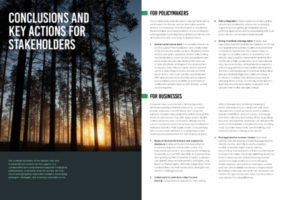Rapid advances in nature data technologies make regular, low-cost biodiversity monitoring possible. And, as regulatory requirements increase and voluntary frameworks go mainstream, business will invest in better nature data.
Our paper argues that Germany can lead a transformation towards an economy in harmony with nature. It calls for a German initiative that facilitates the generation and sharing of high-quality, in situ biodiversity data, and identifies where businesses, policymakers, researchers and citizen science projects can act together.
Key messages from 'Tackling the Global Biodiversity Crisis"
Prepared by Systemiq on behalf of the SUN Institute Environment & Sustainability, the paper considers the crucial role of biodiversity in the global economy, and the causes of biodiversity loss. It proposes solutions for a climate-neutral and nature-positive future in Germany and beyond, identifying the role that policy-makers, businesses and the public can play.

The climate crisis and the biodiversity crisis are inextricably linked. They are two sides of the same coin. Protecting the climate requires protecting biodiversity and vice versa. Synergetic approaches are needed to address the common causes of both crises.

Nature performs important services that are the basis for agriculture, freshwater and a stable climate. Biodiversity loss directly threatens these ecosystem services and thus the basis of human life.

In the Kunming-Montreal Global Biodiversity Framework (GBF), countries have adopted twenty-three ambitious targets that focus in particular on the overexploitation of terrestrial and aquatic ecosystems as the main driver of global biodiversity loss. The GBF calls inter alia for the restoration and protection of at least 30 percent of all land and sea areas globally by 2030.

Investors, regulators, businesses, and customers require better data to assess the impact of supply chains on biodiversity and enable ambitious nature strategies. For example, better data is needed for biodiversity reporting requirements linked to the EU’s Corporate Sustainability Reporting Directive (CSRD), disclosures under the Taskforce on Nature-related Financial Disclosures (TNFD) and for nature targets under the Science-Based Targets Network (SBTN).

We are experiencing rapid advances in nature data technologies (e.g., remote monitoring, sensors, eDNA, citizen science, drones) that make regular, low-cost monitoring of biodiversity possible. These new data technologies are transformative for national and business nature strategies, and they enable new financial products.

We see particular opportunities for Germany to redefine “Made in Germany” and lead the global industrial transformation towards an economy in harmony with nature. This will require a concerted effort to develop nature data standards and drive better nature data in Germany and beyond.

Current efforts to increasing the availability of biodiversity data in Germany focus on connecting data collected by authorities, associations, research, and citizen science projects. These initiatives are welcome for strengthening the publicly available pool of state of nature data, which can in turn contribute to strengthening integrated climate and biodiversity strategies.

As regulatory requirements increase, and voluntary frameworks like SBTN and TNFD go mainstream, business will invest in better nature data. Germany can become a leader in this space, so we recommend a German initiative to generate more high-quality in situ biodiversity data by engaging business to collect, use, and share data. This paper outlines concrete options for action.



